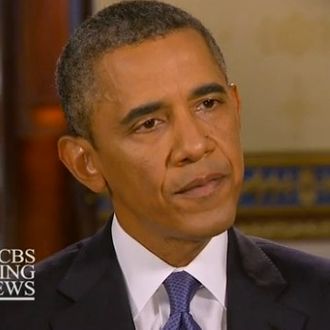
The potential Syria solution that John Kerry stumbled on gained momentum on Monday evening when President Obama said he thinks it “could potentially be a significant breakthrough” – though he’s taking it “with a grain of salt.” Russia is being credited with turning Kerry’s “rhetorical argument” into an actual proposal to have Bashar al-Assad turn over his chemical weapons, but in interviews with six news outlets, Obama pointed out that we wouldn’t even be talking about disarming Assad if it weren’t for the U.S.“I think what we’re seeing is that a credible threat of a military strike from the United States, supported potentially by a number of other countries around the world has given them pause and makes them consider whether or not they would make this move,” Obama told NBC News.
The president acknowledged that the American people aren’t on board with a strike on Syria, and said he’ll lay out his reasons for intervention when he meets with Congress this week and addresses the nation on Tuesday night. “We should all be haunted by those images of those children that were killed,” Obama told CBS News. “But more importantly, we should understand that when when we start saying it’s okay to – or at least that there’s no response to the gassing of children, that’s the kind of slippery slope that leads eventually to these chemical weapons being used more broadly around the world. That’s not the kind of world that we want to leave to our children.”
Here’s are the other highlights from Obama’s interviews.
On the Russian proposal:
“It’s possible if it’s real. And, you know, I think it’s certainly a positive development when the Russians and the Syrians both make gestures toward dealing with these chemical weapons. This is what we’ve been asking for not just over the last week or the last month, but for the last couple of years … But I have to consistently point out that we have not seen these kinds of gestures up until now and in part, the fact that the U.S. administration and I have said we are serious about this, I think, has prompted some interesting conversations.” – CNN
On why the U.S. should intervene in Syria:
“I have shown great restraint, I think, over the last two years, despite the heartbreak that’s happened there. But what I have said is that the ban on chemical weapon use is something that is of U.S. national interest. It protects our troops, so that they don’t have to wear gas masks whenever they’re in theater, the weapons by definition are indiscriminate and don’t differentiate between somebody in uniform and a child.” – CBS News
On Assad’s threats against the U.S.:
“Mr. Assad doesn’t have a lot of capability. He has capability relative to children. He has capability relative to an opposition that is still getting itself organized and are not professional trained fighters. He doesn’t have a credible means to threaten the United States. His allies, Iran and Hezbollah, could potentially engage in asymmetrical strikes against us, but frankly the kind of threats that they could pose against us are typical of the kind of threats that we’re dealing with around the world and that I’ve spoken of recently, which is embassies being threatened, U.S. personnel in the region. Those are threats that we deal with on an ongoing basis. They are always of concern … but the notion that Mr. Assad could significantly threaten the United States is just not the case.” – CNN
On the claim that Syria will be a repeat of Iraq:
“You know, I’m not sure that we’re ever going to get a majority of the American people after over a decade of war after what happened in Iraq to say that any military action, particularly in the Middle East, makes sense in the absence of some direct threat or attack against us. And that’s understandable. If you talk to my own family members or Michelle’s, they’re very wary and suspicious of any action. So tomorrow I’ll speak to the American people. I’ll explain this is not Iraq, this is not Afghanistan, this is not even Libya. We’re not talking about boots on the ground. We’re not talking about sustained airstrikes. We’re talking about a very specific set of strikes to degrade his chemical weapons capabilities in terms of delivery.” – PBS
On the authorization vote in Congress:
GWEN IFILL, PBS: “Do you regret taking it to Congress?” OBAMA: “Absolutely I do not.”
CHRIS WALLACE, FOX NEWS: “You think this is going to happen over a couple of weeks? OBAMA: “I do believe that it’s going to take some time. You guys have polls, and you do head counts, and right now the American people are not persuaded. Right now, members of Congress who are just getting back still have questions.”
SAVANNAH GUTHRIE, NBC NEWS: “And you’re confident you’re going to get the vote?” OBAMA: “You know, I – I wouldn’t say I’m confident. I’m confident that the members of Congress are taking this issue very seriously and they’re doing their homework and I appreciate that.”
Most shameless pandering by the president:
“I think we should explore and exhaust all avenues of diplomatic resolution of this, but I think it’s important for us to keep the pressure on, and to quote – or to paraphrase at least – a former U.S. president, Ronald Reagan, it’s not enough just to trust, we’re going to have to verify.” - Fox News
Most shameless pandering by an interviewer:
WOLF BLITZER, CNN: “What I’d like you to do Mr. President, if you’re amenable to doing it: Look into the camera, talk directly to President Bashar al-Assad, tell him specifically what you think he must do to avert a U.S. military strike.” OBAMA: “You know, I don’t need to talk in the camera. I suspect he’s got people who will be watching this.”






























